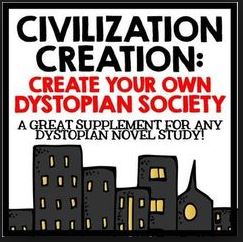I love dystopian fiction as much as I love bacon, and I really love bacon. The theme of hopelessness as an entertaining genre really appeals to me – although hopelessness & entertainment is rather conflicting. How can anyone want to put themselves through 400 pages of a hopeless world, with, as often happens, a hopeless outcome? It’s quite fascinating.
I feel the same applies for horror. Some people are sadistic enough to put themselves through the brutality of a gory murder scene, or a hair-raising haunted house. In this respect, the dystopian genre offers something like that of horror – a no-win page turner (Hollywood endings aside). I feel that this is where horror and dystopian certainly have a relationship. They both offer bleak outlooks. Our protagonist is usually a reluctant hero, thrown into the morbid world in which they are forced to function, and must make do with it.
I am currently working on my first dystopian novel, and am loving the genre so much, that I certainly plan to write more. Although it might not necessarily be the newest genre (though may certainly be – another topic for debate there), it is one of the lesser explored. You can see this to be true when perusing a bookshop, and the dystopian shelf is either very small, or completely absent.
For this reason, it is a duty to fill those shelves with new material. This shouldn’t be too hard, either. The real world is currently presenting us with a plethora of dystopian-themed inspiration:
- Totalitarian leadership
- The segregation of countries
- Hermit states
- VR and the rise of the robot
- Social media replacing social lives
- And many more
These general themes are inspiration enough to create your own dystopian bestseller. Since the start of my journey, I have come up against a multitude of challenges and thought processes only this genre can create. Below are some of the meanderings around the topic that I have come to question:
- Dystopian, as a genre itself, is tough. Dystopian, in my experience, is more of a concept, a landscape, a world, a system. To claim this as a genre is a tricky task, because stuff needs to happen. My story has naturally merged with another genre to offer a traditional plot. On this occasion, it was the thriller genre, creating a hybrid piece of work.
- Being technologically advanced. Technology is moving so damn fast that all those sci-fi movies from the last 10-20 years are pretty much obsolete – we have caught up with them. When thinking of something so technologically ahead of its time, it is tough, as you have to skip further into the realm of invention to ensure you don’t trip up on things already created. It is astonishing to see how far we have come with technology – the future is already here. It was only recently I went to a science museum to find a prototype of a futuristic car very similar to the design of a car I had in my head for the book. And this was in a museum, not even in a testing lab!
- There is a totalitarian regime. Many dystopian books have a hopeless world where something key is missing: natural ore, social skills, currency etc etc., but the one common denominator is that there is suppression. This suppression is usually conducted by a powerful entity, like the police, the government, big businesses, or gangs. Although it is a hopeless world, there always seems to be a hierarchy.
Dystopian fiction is fun to write as it gives you the opportunity to go to town in moulding a world at your most merciless desires. But with most dystopian books, the regime/problem often wins because it’s difficult for one protagonist to change a societal concept. I think to break that ideology is the challenge, and something I am trying to achieve.
Best to keep on writing and see how we go!
Happy writing.

